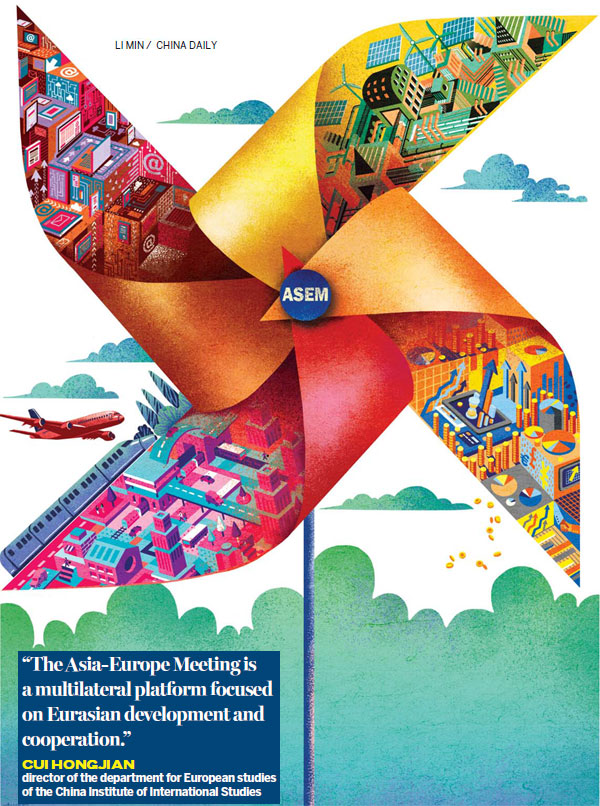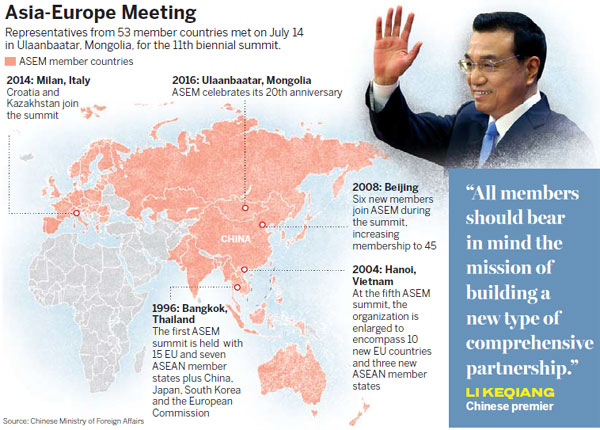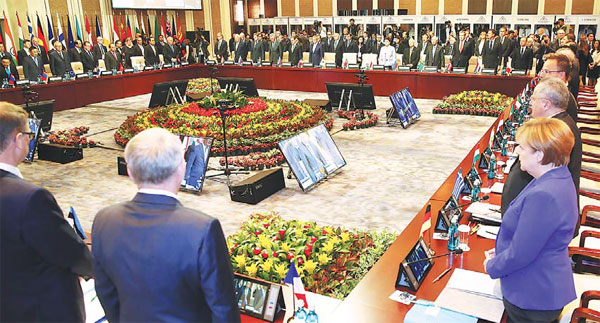Eurasian entente
Updated: 2016-07-22 07:34
By Zhao Huanxin in Ulaanbaatar(China Daily Europe)
|
|||||||||
Asian and European leaders agree to join forces to resolve common challenges and properly handle any disputes
Few trips made by Chinese Premier Li Keqiang have been more sensitively and subtly timed than his first overseas journey of the year.
Li made an official visit to Mongolia from July 13 to 14, and attended the 11th Asia-Europe Meeting summit in Mongolian capital Ulaanbaatar from July 15 to 16.

A new Mongolian prime minister was appointed five days before Li's arrival in Ulaanbaatar, and the South China Sea arbitration ruling was issued one day before the premier left for the visit and the summit, whose opening was clouded by a terrorist attack in Nice, France.
What many had thought would be a northern journey full of questions and qualms, however, ended with a commitment from China and Mongolia to synergize development strategies, and a summit chair's statement stressing the need to promote interconnectivity, which means joining things, as in a network.
Analysts were quick to note that neither the statement nor the Ulaanbaatar Declaration, endorsed by Asian and European leaders at the summit's end, contains any words about the South China Sea, but it does strongly address terrorism.
"Leaders ... expressed their determination to counter terrorism and prevent violent extremism in all forms," the statement said.
Cui Hongjian, director of the department for European studies at the China Institute of International Studies, says he was not surprised that the statement and declaration excluded the South China Sea.
"The Asia-Europe Meeting is a multilateral platform focused on Eurasian development and cooperation. The summit's discussions should not be distracted by bilateral issues," Cui says.
The country consistently has said the South China Sea issue should not be subject to multilateral discussions, but that disputes should be settled through bilateral dialogue and consultation by countries directly involved, on the basis of historical facts and in line with international law, he says.
Days before the premier's visit, China's Foreign Ministry had said the ASEM Summit was "not an appropriate venue" to discuss the issue.
Japan, however, had intended to bring the issue to the summit, according to a senior Chinese diplomat. Prime Minister Shinzo Abe, addressing an informal meeting of the ASEM Summit on July 16, talked about the South China Sea arbitration.
Li refuted Abe's comments and spelled out China's stance, says the diplomat, who asked to remain anonymous.
Li said China had not participated in the arbitration unilaterally initiated by the Philippines. Beijing neither accepts nor acknowledges the so-called arbitration award, he added.
The premier had 11 bilateral meetings with other senior leaders during the summit. His effort to promote China's stand on the South China Sea issue received widespread backing and understanding, the diplomat says, adding that except for the Philippines, no other meeting participants echoed Abe's comments at the summit.
Pragmatic cooperation
Twenty years after the creation of the ASEM mechanism, regional leaders attending the 11th summit charted a new course for bicontinental cooperation in the next decade through promotion of interconnectivity.
The Chinese premier called on 53 members of the ASEM to further advance practical cooperation and promote dialogue so as to build a more prosperous and peaceful Eurasia.
"As the ASEM begins its third decade, all members should bear in mind the mission of building a new type of comprehensive partnership" and actively seek new paths to further promote Asia-Europe cooperation, Li said.
The inauguration of the ASEM in 1996 in Bangkok, Thailand, ushered in a new era of equal dialogue, all-around cooperation and joint action against challenges on the two continents, he said.
Now China and Europe are each other's largest trading partner, with two-way trade amounting to nearly $700 billion in 2015, he added, noting that cooperation between Asia and Europe has reached an unprecedented level.
Asia and Europe have great opportunities before them, but also tough challenges, especially the thorny issues of terrorism and the refugee crisis, he said.
The situation calls for ramped-up efforts to push forward all-around cooperation in Eurasia while seeking ways to raise the cooperation levels in a spirit of mutual respect and equal consultation.
In elaborating on his proposal of "renovating the Euro-Asia cooperation concept", Li urged ASEM members to foster an awareness of a community of shared responsibilities and destinies, to effectively counteract challenges besetting Asia and Europe.
Cui at the China Institute of International Studies, says the Nice attack had added to the urgency European and Asian leaders feel to foster a "community of shared destines". "Terrorism can to the greatest extent unite people from various countries, whether they are European or Asian," he says.
At the summit, Li suggested ASEM members engage in dialogue and cooperation, and prevent new sources of tumult from occurring in their own regions so as to safeguard world peace and regional stability.
The global community should advocate unity and coordination, he said, and discard a Cold War mentality and zero-sum game.
The premier said China opposed any country distorting international law and applying a double standard in addressing disparities and disputes.
Instead of arousing confrontation and conflict, all should abide by established rules and seek resolutions in a peaceful way and through political means.
"We've always held that countries, big or small, rich or poor, strong or weak, must all abide by laws and rules. We are always committed to peaceful development," he said.
To add impetus to Eurasian partnership, Li proposed guiding Asia-Europe cooperation, especially in economy and trade, by a more pragmatic course.
To this end, the premier said he expected the ASEM Economic Ministers' Meeting would resume next year after a decadelong suspension, and called for efforts to speed up the development of an open and inclusive Asia-Europe market.
To promote "partnership for the future through interconnectivity", this year's ASEM summit established an interconnectivity working group on the basis of a consensus secured by China over the past three years.
According to Li, the Eurasian continent, bordering both the Pacific and the Atlantic oceans, should become a huge passageway from east to west for transportation, telecommunications and energy.
China is expected to host a high-level forum on digital interconnectivity in its further effort to promote Asia-Europe interconnectivity in order to pool driving forces for regional economic growth and innovation cooperation.
The premier also highlighted the need to fortify the human and cultural aspects of the cooperation between Asia and Europe, saying that there should be more dialogue between different civilizations, and more exchanges in education, science, tourism and culture.
Li also touched on China's economic situation, saying that the world's second-largest economy is confident it will reach its growth target.
Zhao Junjie, an expert on European studies at the Chinese Academy of Social Sciences, says the proposals raised by the premier show that "Chinese leaders are considering the strategic direction of Asia-Europe cooperation", as the world situation has changed significantly since ASEM was initiated.
"Europe has been stricken with a refugee crisis and terrorist attacks. It is apparent that the premier paid close attention to the problems facing Europe, and he put forward countermeasures in his first proposal."
'Unity in difficult times'
Speaking at the summit's final news conference, European Commission President Jean-Claude Juncker set out the priorities for the work ahead.
"We know what the global challenges are. We discussed them: fighting terrorism, pursuing our trade agenda in order to create jobs, moving ahead after the Brexit vote, tackling climate change and the refugee crisis. We know they require global responses. And this is what we will deliver."
Juncker said the summit was bringing Asia and Europe closer together. He has attended 10 out of the 11 ASEM summits, including the first one in 1996. "I can credibly say that this was a very special summit. At the plenary, I was speaking about connectivity. This is exactly what this summit was about: showing unity in difficult times," said Juncker, who served as prime minister of Luxembourg from 1995 to 2013.
"Nice, Turkey, other events - the ASEM Summit provided the right and flexible framework for us to talk openly and frankly about events unfolding across the world that affect us all. We know what the global challenges are."
Fu Jing in London and Xinhua contributed to this story.
zhaohuanxin@chinadaily.com.cn

|
Leaders stand for a minute's silence for the victims of the deadly attack in the French city of Nice before the opening session of the 11th Asia-Europe Meeting in the Mongolian capital of Ulaanbaatar on July 15. Damir Sagolj / AFP |
(China Daily European Weekly 07/22/2016 page1)
Today's Top News
French president urges Britain to begin EU exit talks
Turkey to restructure its army after coup attempt
UK to keep close economic ties with Germany: May
China's Fosun buys UK's Wolves for 45 million pounds
Rio 2016: Russia loses doping appeal
Brussels police: Bomb aleart was false alarm
May takes center stage in parliament's box-office show
Turkey's failed coup to consolidate Erdogan's power
Hot Topics
Lunar probe , China growth forecasts, Emission rules get tougher, China seen through 'colored lens', International board,
Editor's Picks

|

|

|

|

|

|








